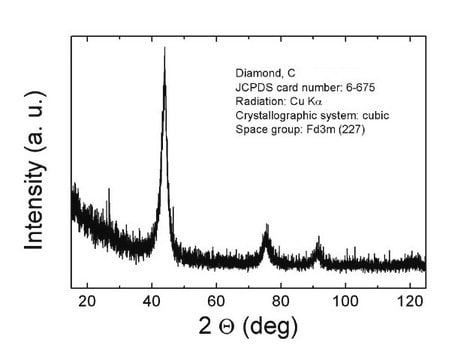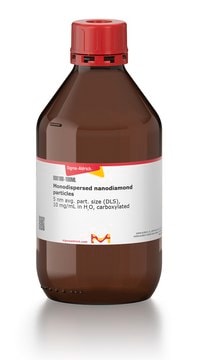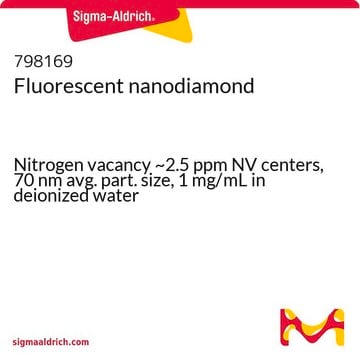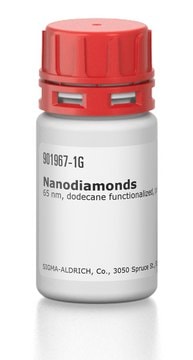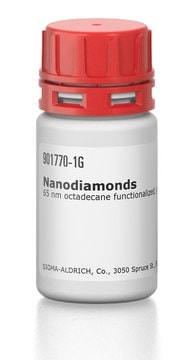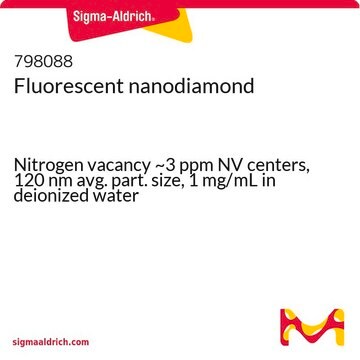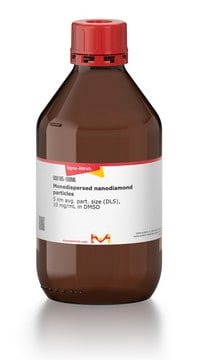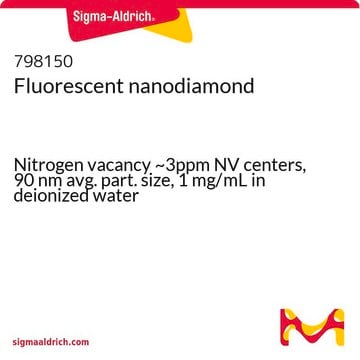636428
Diamond
nanopowder, <10 nm particle size (TEM), ≥97% trace metals basis
Synonym(s):
Diamond dust
Sign Into View Organizational & Contract Pricing
All Photos(1)
About This Item
Empirical Formula (Hill Notation):
C
CAS Number:
Molecular Weight:
12.01
EC Number:
MDL number:
UNSPSC Code:
12352302
NACRES:
NA.23
Recommended Products
Assay
≥97% trace metals basis
form
nanopowder
spherical
surface area
200-450 m2/g , BET
particle size
<10 nm (TEM)
density
3.5 g/mL at 25 °C (lit.)
bulk density
0.2‑0.7 g/mL
Looking for similar products? Visit Product Comparison Guide
Related Categories
General description
The particle size of diamond nanopowder is less than 50 nm and surface area is an average of 100 m2/g. Diamond nanopowder may be produced by multicathode direct current plasma chemical vapor deposition and high pressure high temperature (HPHT). Potential uses of nano-diamond are in biosensor applications. Surface modification of nano-diamond may enhance its linking mechanism with specific biomolecules.
Application
- Insight into Interfacial Heat Transfer of β-Ga(2)O(3)/Diamond Heterostructures via the Machine Learning Potential.: This study explores the interfacial heat transfer in β-Ga2O3/diamond heterostructures, providing critical insights for thermal management in high-power electronics, a key component in the development of efficient energy storage and conversion systems (Sun et al., 2024).
- Impurity characterization in diamond for quantum and electronic applications: advances with time-resolved cathodoluminescence.: The study details advancements in characterizing impurities in diamond, crucial for the development of quantum computing devices and other high-precision electronic applications, using innovative time-resolved cathodoluminescence techniques (Arnold et al., 2024).
- Thermal Conductivity and Sintering Mechanism of Aluminum/Diamond Composites Prepared by DC-Assisted Fast Hot-Pressing Sintering.: Focused on enhancing the thermal management capabilities of materials, this research investigates the thermal properties of aluminum/diamond composites, vital for developing more efficient cooling systems in electronic and energy storage devices (Jia et al., 2024).
Storage Class Code
11 - Combustible Solids
WGK
nwg
Flash Point(F)
Not applicable
Flash Point(C)
Not applicable
Personal Protective Equipment
dust mask type N95 (US), Eyeshields, Gloves
Certificates of Analysis (COA)
Search for Certificates of Analysis (COA) by entering the products Lot/Batch Number. Lot and Batch Numbers can be found on a product’s label following the words ‘Lot’ or ‘Batch’.
Already Own This Product?
Find documentation for the products that you have recently purchased in the Document Library.
Customers Also Viewed
Reactions of amines with CVD diamond nanopowders.
Lee J K, et al.
Diamond and Related Materials, 14(3-7), 675-678 (2005)
Functionalized diamond nanopowder for phosphopeptides enrichment from complex biological fluids.
Hussain D, et al.
Analytica Chimica Acta, 775, 75-84 (2013)
Thermo-oxidation of tokamak carbon dust.
Davis JW, et al.
Journal of Nuclear Materials, 386, 764-767 (2009)
Jayakumar Shalini et al.
Nanoscale, 5(3), 1159-1167 (2013-01-05)
Significant difference was observed for the simultaneous detection of dopamine (DA), ascorbic acid (AA), and uric acid (UA) mixture using nitrogen incorporated diamond nanowire (DNW) film electrodes grown by microwave plasma enhanced chemical vapor deposition. For the simultaneous sensing of
Mikhail V Korobov et al.
Nanoscale, 5(4), 1529-1536 (2013-01-15)
Detonation nanodiamond (ND) is a suitable source material to produce unique samples consisting of almost uniform diamond nanocrystals (d = 3-5 nm). Such samples exist in the form of long stable aqueous dispersions with narrow size distribution of diamond particles.
Our team of scientists has experience in all areas of research including Life Science, Material Science, Chemical Synthesis, Chromatography, Analytical and many others.
Contact Technical Service